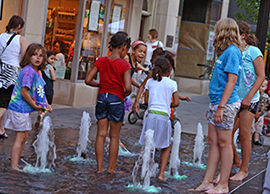Village of Oak Park Attorney Paul Stephanides provided what follows regarding the legal parameters governing unhoused persons.
Applicable Case Law
The leading federal court cases on the issue of legal tools concerning homelessness involve two different approaches. The first approach is a wide-spread ban against homeless encampments in a municipality. The second approach is to prohibit homeless encampments only in certain areas of a municipality.
In the cases of Johnson v. City of Grants Pass, 50 F.4th 787 (9th Cir. 2022) and Martin v. City of Boise, 902 F.3d 1031 (9th Cir. 2018), the Ninth Circuit Court of Appeals held that in the absence of adequate shelter beds, people experiencing homelessness can use tents, sleep in vehicles, or use other forms of protection from the elements without being subject to civil or criminal punishment. In both cases, the court held that the applicable municipalities’ custom, pattern, and practice of enforcing anti-camping ordinances, anti-sleeping ordinances, and criminal trespass laws against involuntarily homeless individuals violated the Eighth Amendment of the United States Constitution’s Cruel and Unusual Punishment clause. The court in the Martin case stated that its holding was a “narrow one,” and only applied “so long as there is a greater number of homeless individuals in a jurisdiction than the number of available beds in shelters.” Martin, 920 F.3d at 615.
The federal district court in the case of Frank v. City of St. Louis, 458 F.Supp.3d 1090 (E.D. Mo. 2020), did not follow the holding in the Martin case cited above because of significant factual differences. In the Martin case, the City of Boise’s ordinance was enforced throughout the city. In the Frank case, the City of St. Louis prohibited a homeless encampment in a specific part of the city pursuant to a notice and order enacted in response to the COVID-19 pandemic. St. Louis identified the area as especially high risk for the spread of COVID-19. Persons who attempted to inhabit the encampment in the prohibited area were free to sleep in other areas of the city without being in violation of the notice and order.
Furthermore, St. Louis stated in the case that it did not intend to arrest individuals who had been residing at the encampments. Rather, the city’s intent was to ensure that those individuals move from the encampments to safer alternative housing options. The notice and order posted at the encampments stated that there was sufficient alternative housing available to everyone that slept at the location.
Bill of Rights for the Homeless Act
The State of Illinois enacted the Bill of Rights for the Homeless Act in 2013. The Act provides that the homeless have “the right to use and move freely in public spaces, including but not limited to public sidewalks, public parks, public transportation, and public buildings, in the same manner as any other person and without discrimination on the basis of his her or housing status.” 775 ILCS 45/10(a)(1). “Housing status” under the Act “means the status of having or not having a fixed or regular residence, including the status of living on the streets, in a shelter, or in a temporary residence.” 775 ILS 45/10(b).










